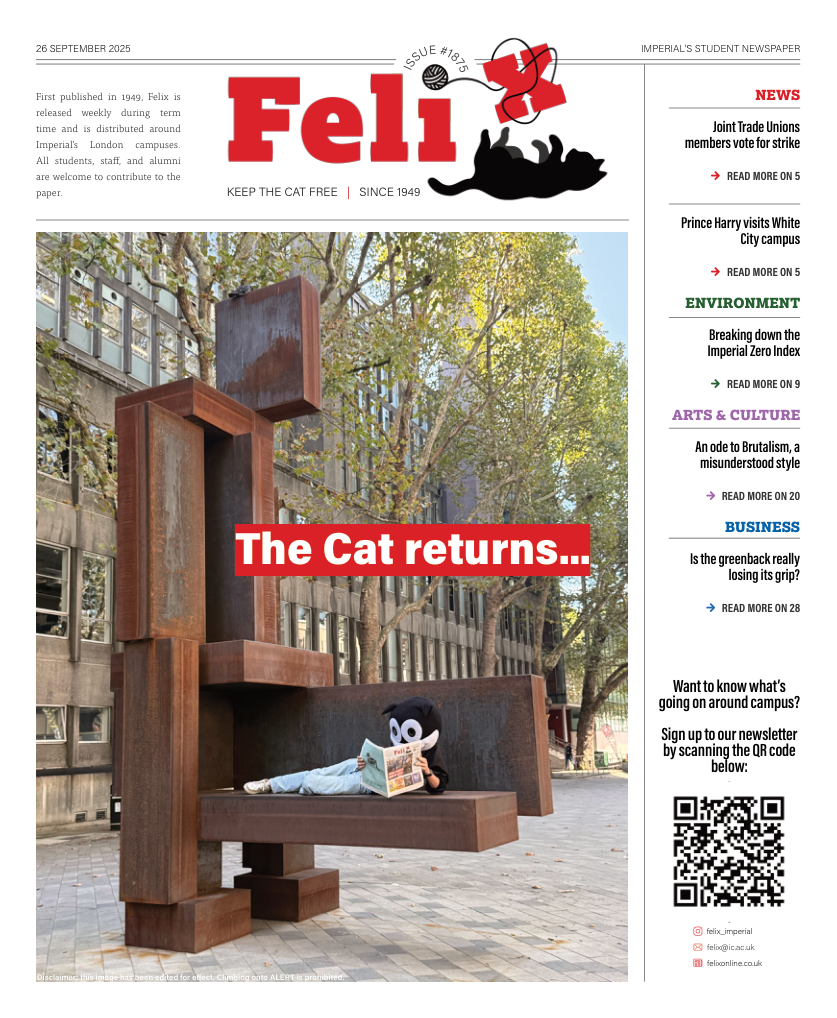Unionised staff reject final pay award and vote for strike action
Members of Imperial’s Joint Trade Unions (JTU) have voted in favour of strike action following a dispute with the College over its 2025/2026 pay award.
The Imperial branch of the University and College Union (UCU) announced on Tuesday 16th September that 77% of its members had backed strike action in a ballot that saw a 59% turnout. The strike days have not been made public yet.
The vote comes after the JTU, which represents Imperial’s three recognised staff Unions (the UCU, Unite, and Unison), opposed the College’s final pay award for the coming academic year.
The pay award granted Imperial staff a 2% increase in salaries across the board, effective since the start of August. This is lower than the initial increase demanded by the JTU, which stood at 5.2%, in addition to a £2,000 lump sum for each employee. This claim was revised to a 7.2% increase during the negotiations, on the basis of new figures reflecting higher inflation in London.
The JTU argued that the 2% pay award is sub-inflationary and amounts to “cuts in the real value of pay”. The Consumer Prices Index (CPI), a standard inflation metric, stood at 3.8% year-on-year in August 2025. The JTU further pointed to the financials of the university, considering its reserves and £81 million operating surplus healthy.
Imperial called the final pay offer “competitive, fair and sustainable,” and said that total staff cost increases ran higher than inflation, when considering expenses beyond the pay claim. These include one-off payments granted through the Equity and Achievement Framework, automatic increments received by around half of staff members, and higher employer National Insurance contributions.
The UCU said that one-off payments were based on “subjective and non-transparent assessment” and said that conflating them with cost-of-living increases was “not helpful to discussions.”
According to its Pay & Pensions policy, Imperial aims to pay “in the median-to-upper quartile” compared benchmarkers. The College noted that the latest data “shows the University pays higher than its national comparators across all of our job grades and families.”
In a recent staff webinar, Imperial President Hugh Brady said the university was faced with “a tough balancing act” between pay increases and financial sustainability “in the current climate.” He cited flaws in the higher education financing model, a possible government levy on overseas tuition fees, high energy prices and elevated inflation as reasons for Imperial’s rejection of the JTU’s pay claim, which was deemed “not affordable” in the final pay documentation.
The JTU also formulated three non-salary requests, namely an annual leave increase from 25 to 30 days, an augmentation of annual carer’s leave from one week unpaid to two weeks paid, and a request that the College sets up a working group to look into the possibility of moving to a 4-day week. An internal JTU poll resulted in 57% of respondents selecting a 4-day working week as one of their top three non-salary priorities, and 48% selecting additional annual leave.
Imperial declined to set up a working group, arguing that the adoption of a 4-day working week could result in “inequality among staff” since “not all roles [at Imperial] can accommodate a 4-day working week.” The College also rejected the JTU’s requests for extra annual and carer’s leave, instead expanding paternity leave from 2 to 4 weeks and increasing the number of university closure days from six to eight.
An Imperial College London Spokesperson said: “We remain committed to ensuring that staff are appropriately recognised and rewarded for the vital role they play. In uncertain times it is important that we plan for the long-term future of our institution for the benefit of our students and staff.”
The university will be open as usual during the strikes, although the UCU warned of “disruption on campus”.
Correction: the print version of this article notes: "The benchmarking webpage appears to have been taken down since this article was written." This is misleading and has been removed from subsequent versions of the article. The webpage was temporarily unavailable while the article was in writing, but is accessible again as of publication.










